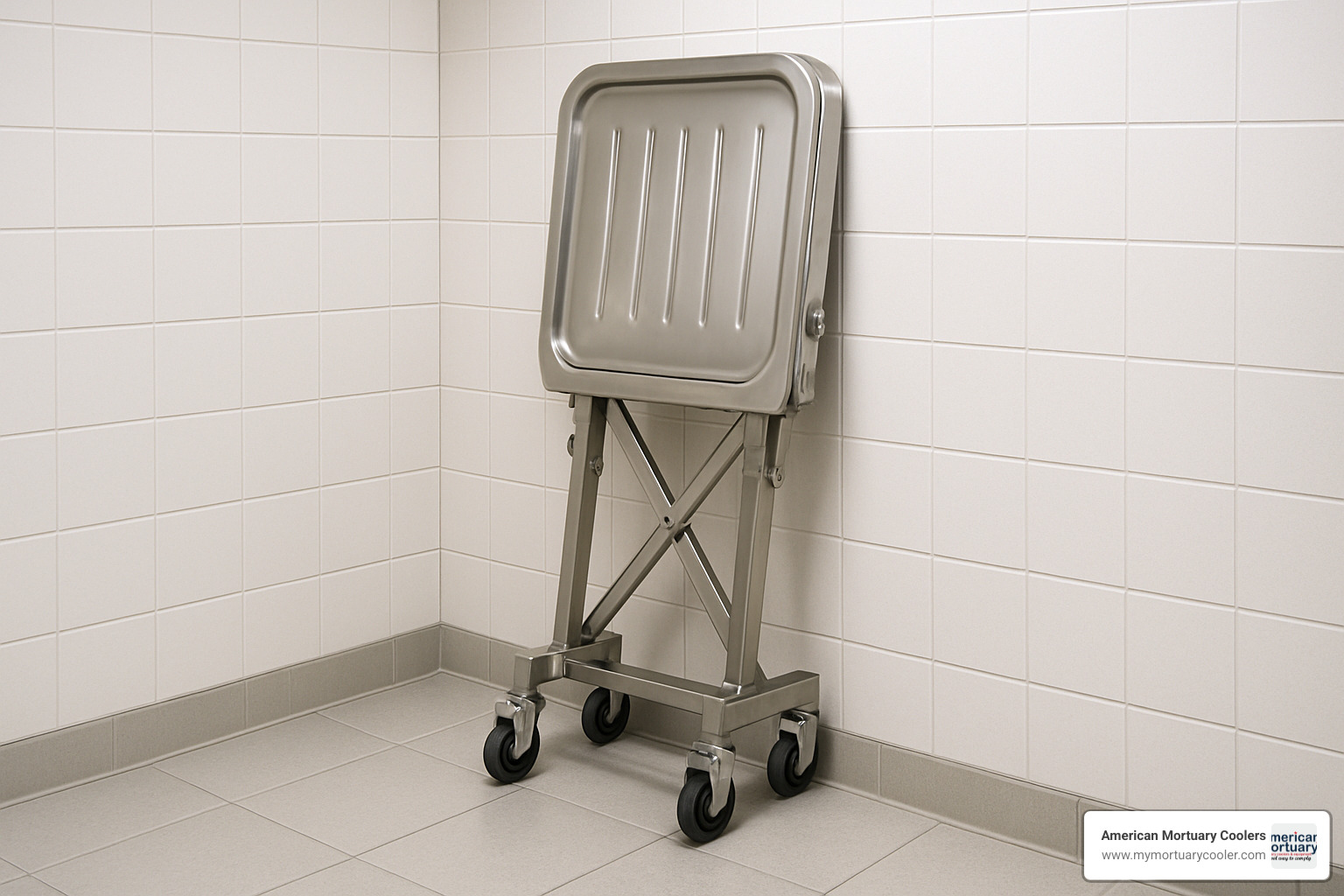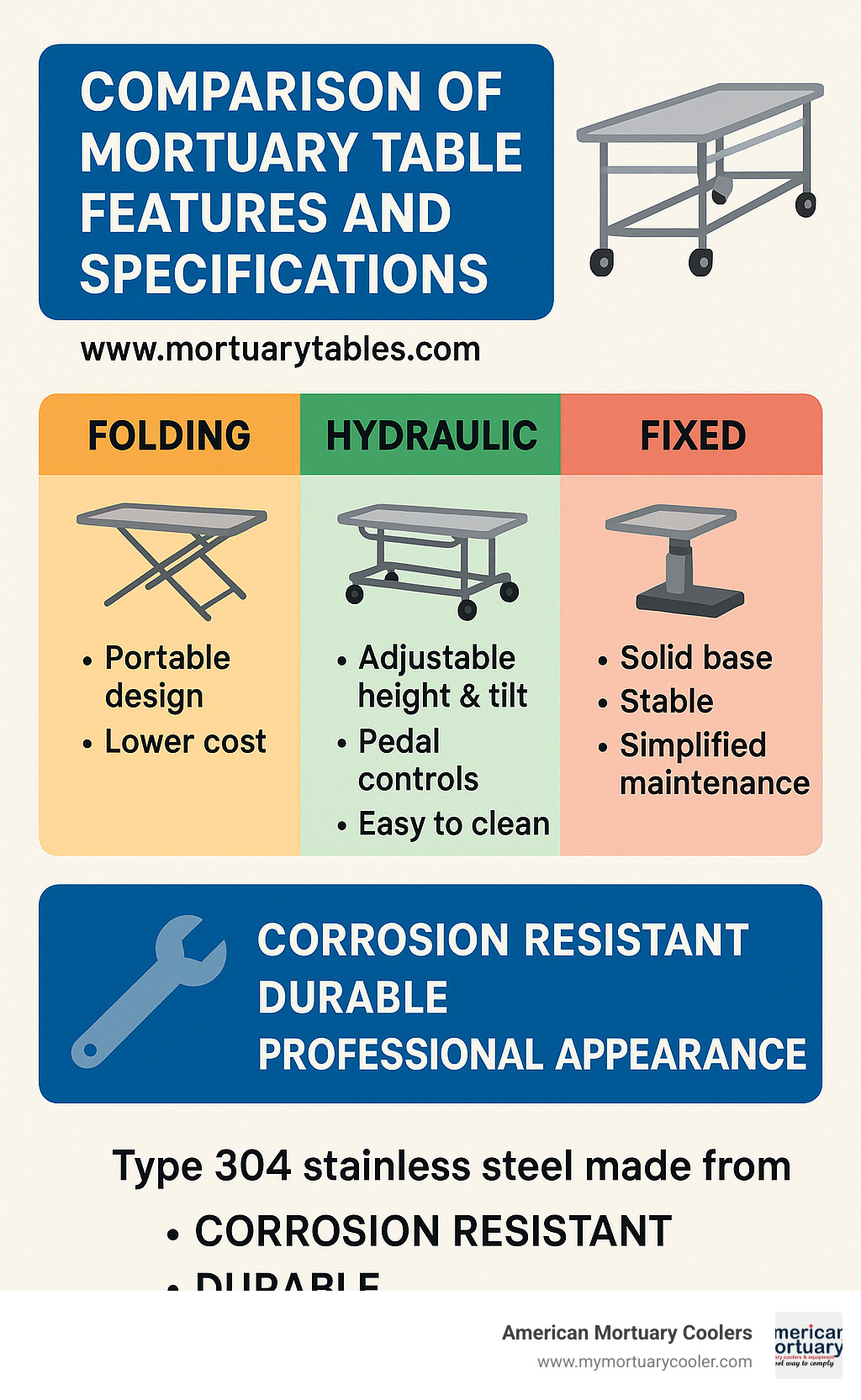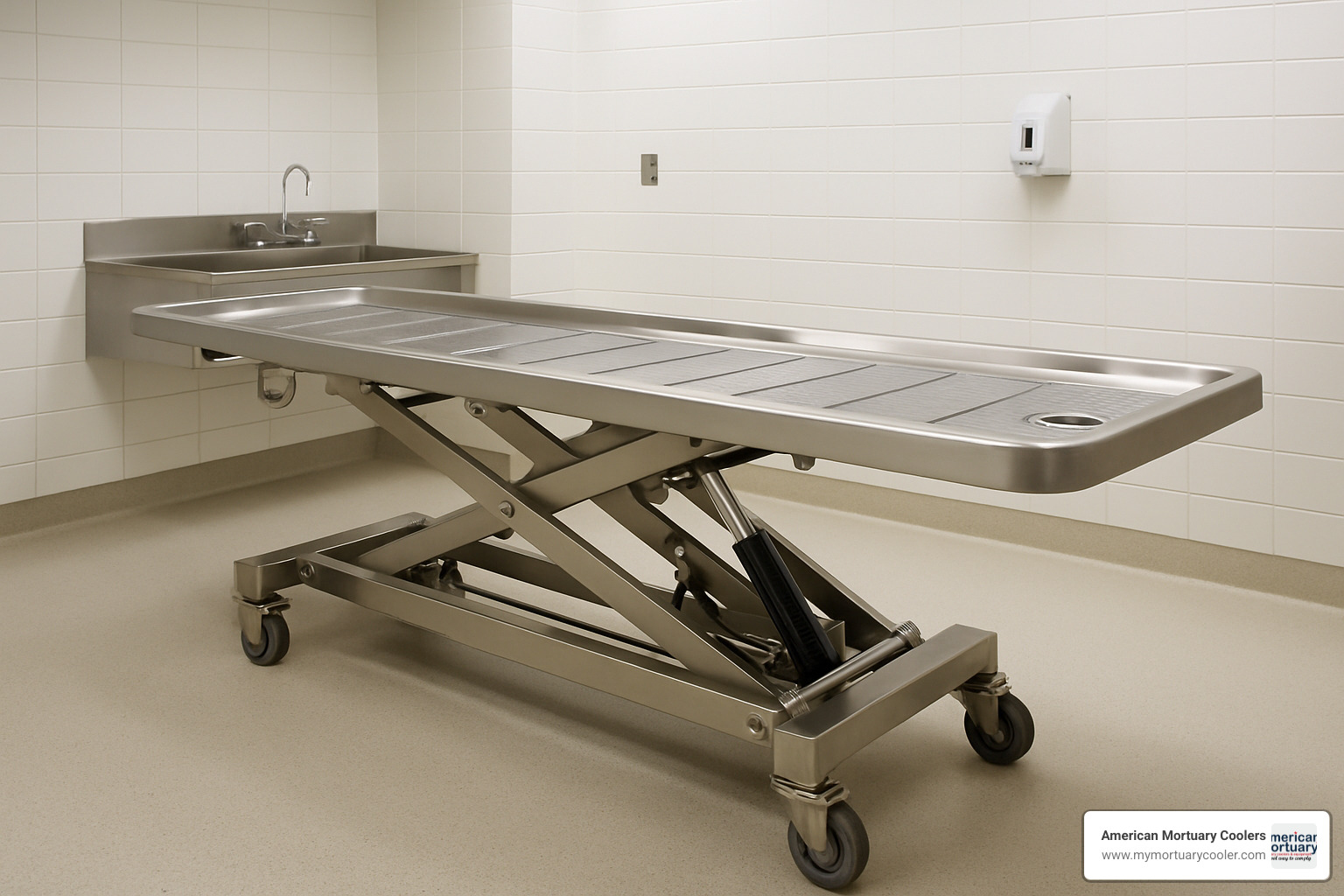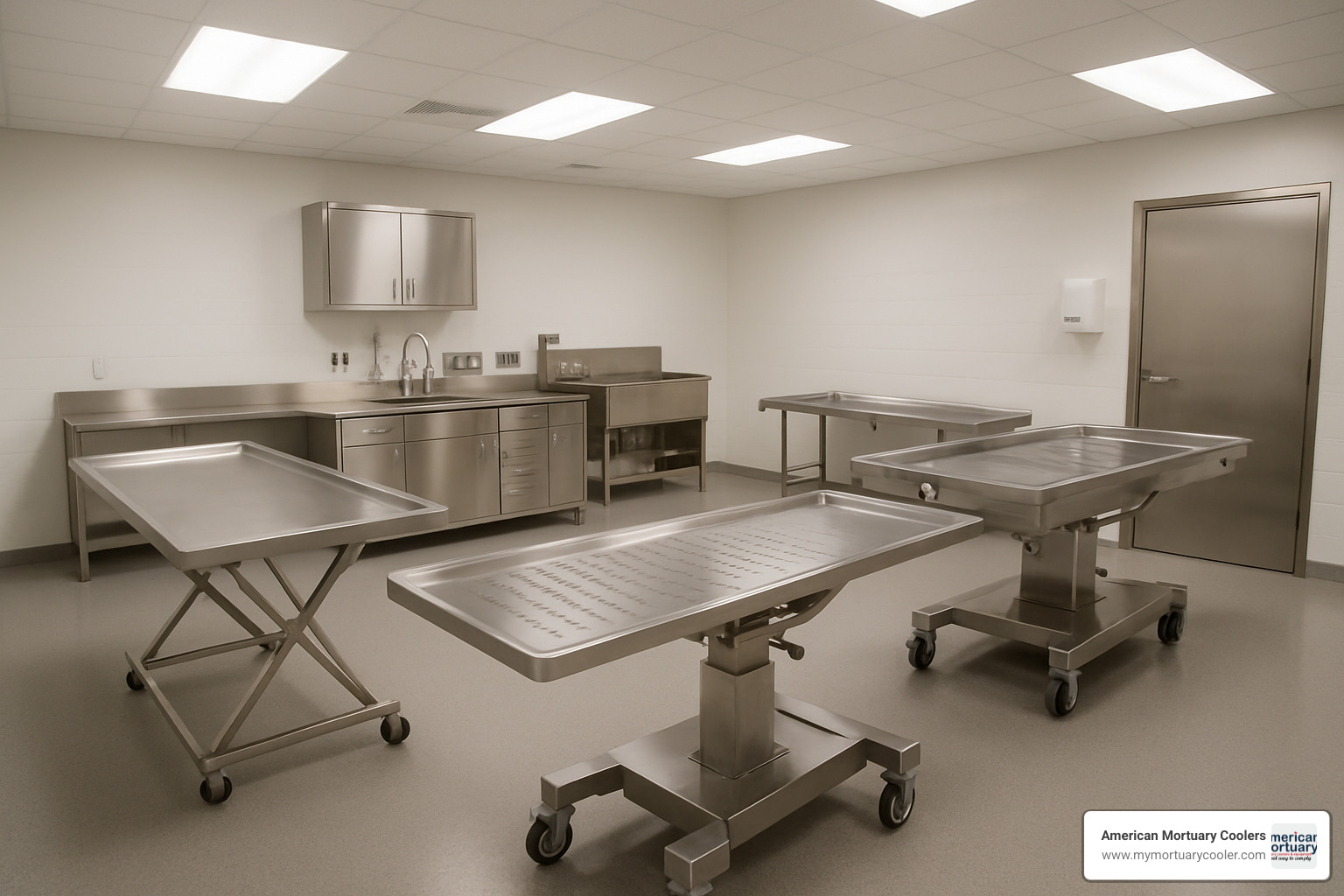Finding the Right Mortuary Table Supplier
If you're searching for information about mortuary tables online, you might have come across the search term "www.mortuarytables.com" — the dedicated product portal managed by our team at American Mortuary Coolers. Below is a quick snapshot of what mortuary tables are all about:
| Mortuary Tables Overview |
|---|
| • Essential equipment for funeral homes and medical facilities |
| • Available in folding, hydraulic, and fixed mortuary/embalming styles |
| • Product weight capacities range from 600-1,000 pounds |
| • Price range spans from $230 for basic models to $6,000 for premium options |
| • Features include stainless steel construction, height adjustment, and drainage systems |
| • Folding tables compact to approximately 59" × 25" × 13" for space-saving storage |
| • Designed to meet OSHA and NFDA safety and sanitation standards |
The funeral industry relies on specialized equipment that balances functionality with respect for the deceased. Quality mortuary tables serve as a comprehensive resource for mortuary professionals seeking preparation tables that meet the demands of modern funeral services. Whether you need space-saving folding dressing tables that store compactly or hydraulic embalming tables with precise height adjustment, having the right equipment is essential for providing dignified and efficient care.
Mortuary tables come in various designs to accommodate different preparation needs and facility constraints. From tables with one-hand release mechanisms that can be set up in under a minute to heavy-duty models supporting up to 1,000 pounds, these specialized surfaces form the foundation of well-equipped preparation rooms across the country.
I'm from American Mortuary Coolers, a national supplier of mortuary equipment with extensive experience providing preparation room solutions for funeral homes of all sizes.

Simple guide to mortuary equipment:
Understanding Mortuary Tables Online
When funeral professionals search for "www.mortuarytables.com" or similar terms online, they're landing on a specialized resource created and maintained by American Mortuary Coolers. The internet offers a wealth of information on everything mortuary tables – from space-saving folding models to sophisticated hydraulic systems that make the challenging work of funeral preparation more dignified and efficient.
Unlike big-box suppliers that treat funeral equipment as an afterthought, our dedicated marketplace understands the unique demands of preparation rooms. We build our reputation by offering a thoughtfully curated selection of tables that meet the exacting standards funeral professionals require.
I recently spoke with a funeral director from Memphis who told me, "When our old table finally gave out after 15 years, I was dreading the replacement process. Finding a specialized supplier made it painless – their team actually understood what we needed without me having to explain funeral basics."
Quality suppliers serve funeral homes of all sizes, from single-location family businesses to multi-branch operations, with nationwide shipping that gets essential equipment where it needs to be, when it needs to be there. The best customer support isn't staffed by generic sales reps – these are people who understand the difference between an embalming table and a dressing table, and why that matters to your work.
Products and Services for Mortuary Professionals
Behind our digital storefront are comprehensive selections that cover every preparation room need. Prep-room tables range from practical folding models starting around $230 to feature-rich hydraulic systems that can run up to $6,000 for specialized applications.
What sets quality suppliers apart is attention to the details that matter in daily funeral work. The best tables include thoughtful features like integrated drainage systems, corrosion-resistant finishes, and ergonomic height adjustments that reduce staff fatigue during long preparation sessions.
Beyond the tables themselves, we offer compatible refrigeration add-ons that work seamlessly with preparation surfaces. For funeral homes with unique spaces or needs, custom sizing options are available – because not every prep room fits the standard template.
"The custom table we ordered for our historic building's narrow prep room was perfect," shared a funeral director from a 120-year-old establishment in Boston. "They measured twice and delivered exactly what we needed, right down to the inch."
Direct delivery service means no coordinating with third-party shippers or worrying about specialized freight handling. And everything comes backed by warranties that actually make sense for funeral equipment – covering the structural components, mechanical systems, and hydraulic elements that matter most in daily use.
What to Look for in a Mortuary Table Supplier
Funeral professionals are notoriously careful about their equipment choices – and for good reason. The work demands reliability, and quality suppliers earn trust through several key strengths:
A broad inventory means you're not piecing together equipment from multiple vendors, hoping everything will work together. From basic dressing tables to sophisticated hydraulic systems, everything should be designed with compatibility in mind.
Every product should meet or exceed both OSHA workplace safety requirements and NFDA guidelines for sanitation and fluid management – because compliance isn't just about avoiding fines, it's about protecting your staff and maintaining dignity in your work.
When a funeral home needs equipment, they typically need it yesterday. The best suppliers maintain stock of popular models for immediate shipment, with most deliveries arriving within a week – critical when you're replacing essential equipment that affects daily operations.
A direct-to-customer model eliminates unnecessary markups, and sensible bundle packages for funeral homes updating multiple pieces simultaneously offer additional value. As one Texas funeral director put it, "The bundle pricing saved us nearly $800 compared to buying each piece separately. That's real money for a small operation like ours."
Perhaps most telling are the testimonials from fellow funeral professionals who've put these tables through the daily rigors of preparation work. These aren't polished marketing testimonials – they're practical assessments from people who understand that in funeral service, equipment failures aren't just inconvenient, they're unacceptable.
At American Mortuary Coolers, we provide high-quality mortuary cooling solutions that complement quality preparation tables. Together, they form the backbone of a well-equipped, efficient preparation facility ready to serve families with dignity and care.
Mortuary Tables 101: Types, Uses & Materials

Let's talk about the backbone of every preparation room – the mortuary table. I've spent years helping funeral directors find the right equipment, and I've learned that understanding the basics makes all the difference when making this important investment.
Mortuary tables come in three main varieties, each designed with specific purposes in mind. Embalming tables feature built-in drainage systems and collection troughs that make fluid management much easier during the preservation process. Dressing tables focus on providing a stable, clean surface for preparing the deceased for viewing – think of them as the final preparation station before a family sees their loved one. Autopsy tables, which you'll typically find in medical examiner offices or teaching institutions, include specialized features for forensic and educational work.
The beauty of modern design is that many tables now serve multiple functions. As one funeral director told me, "Why buy three tables when one well-designed table can do it all?" Many of our customers find tremendous value in multi-purpose funeral home tables that adapt to whatever task is at hand.
When browsing www.mortuarytables.com, you'll notice three primary design styles. Folding designs are perfect for smaller facilities where space comes at a premium – they perform beautifully when needed and tuck away when they're not. Hydraulic lift tables offer height adjustment that saves your back while improving your work quality. Fixed pedestal tables remain stationary, offering rock-solid stability for facilities with dedicated preparation spaces.
The materials used in construction matter tremendously in this environment. Stainless steel continues to rule the roost for table surfaces because it stands up to chemicals, cleaning, and constant use without breaking a sweat. Aluminum frames provide structural support without excessive weight, while laminate tops offer a more budget-friendly option for dressing tables where you're less concerned about fluid resistance.
I've seen 30-year-old stainless steel tables that still look great with proper care – try getting that kind of longevity from lesser materials in a preparation room environment! For a deeper dive into selection criteria, check out our detailed guide to choosing and comparing morgue tables.
Folding Mortuary Tables: Space-Saving Mobility
"I never thought I'd get excited about a folding table until I saw what these can do," a small-town funeral director once told me. Folding mortuary tables are engineering marvels that transform from full-sized workstations to compact storage units in less than a minute.
The genius is in the details. Most quality models feature a one-hand release mechanism that lets you set up or break down while wearing protective gloves – no fumbling with complicated latches. When folded, they typically measure around 59"×25"×13", slim enough to store against a wall or in a utility closet, freeing up valuable space for other uses.
Don't let their collapsible nature fool you – these tables are workhorses. Standard models support 600 pounds, while heavy-duty versions handle up to 1,000 pounds, accommodating nearly any situation you might encounter. The built-in swivel casters with locking mechanisms make it easy to position these tables exactly where you need them, then secure them firmly in place during use.
I remember visiting a historic funeral home in New England that operated out of a 200-year-old building. "These folding tables saved us from having to renovate," the owner explained. "We can transform our multi-purpose room into a preparation space when needed, then convert it back for family conferences within the hour."
Folding tables have been game-changers for rural funeral homes serving wide areas, mobile services that bring preparation capabilities to remote locations, and facilities that experience seasonal fluctuations in case volume. They represent flexibility without compromising on quality or capability.
Hydraulic & Fixed Tables: Heavy-Duty Stability
For busy funeral homes with dedicated preparation spaces, hydraulic and fixed tables offer best stability and functionality. These are the workhorses of the profession – reliable, powerful, and designed for daily use.
Hydraulic tables feature foot-pedal height adjustment that allows you to raise or lower the working surface between 28½" and 40½" without using your hands – maintaining sterile technique throughout procedures. This seemingly simple feature prevents countless back injuries and improves work quality by allowing each embalmer to work at their ideal height.
Many hydraulic models also offer angle tilt options that position the head higher or lower than the feet. "That tilt feature changed my embalming technique completely," one experienced funeral director shared. "The improved drainage means better results with less time and chemicals."
The bariatric capacity of premium hydraulic tables deserves special mention. With weight ratings exceeding 1,000 pounds, these tables accommodate larger individuals with dignity and safety – something every family deserves regardless of their loved one's size. The scissor-lift bases on high-end models distribute weight evenly, maintaining rock-solid stability throughout the height adjustment range.
Fixed pedestal tables take a different approach, eliminating moving parts in favor of unwavering stability. They're often the choice for facilities with standardized procedures and consistent staffing. As one pragmatic funeral director put it, "We know exactly how we work, so we don't need adjustment features – we just need something bulletproof that will last for decades." The simplified maintenance and lower price point make fixed tables an attractive option for many established funeral homes.
Material Matters: Why Stainless Steel Leads
In my years working with funeral professionals, I've learned that material selection might be the single most important factor in long-term satisfaction with mortuary equipment. While various materials have been tried over the decades, Type 304 stainless steel has emerged as the gold standard for good reasons.
The preparation room environment is uniquely challenging. Few other workspaces combine constant moisture, powerful chemicals, rigorous cleaning protocols, and the need for absolute sanitation. Stainless steel thrives under these demanding conditions, offering superior corrosion resistance that withstands years of exposure to water, embalming chemicals, and disinfectants without degradation.
The non-porous surface of stainless steel prevents bacterial growth and allows for complete disinfection between cases – essential for meeting OSHA requirements and NFDA guidelines. As one health department inspector told me, "When I see quality stainless steel tables, I already know half my compliance checks will pass without issue."
The exceptional durability of stainless steel means these tables maintain their integrity and appearance through thousands of cases. They resist dents, scratches, and wear even in the busiest preparation rooms. Their temperature stability ensures they perform flawlessly whether you're working with refrigerated remains or warm water washing.
Beyond the practical benefits, stainless steel conveys a professional appearance that matters in our industry. "Families rarely see our preparation room," one funeral director noted, "but when they do, the quality of our equipment immediately communicates our standards of care."
For supporting structures, aircraft-grade aluminum offers the perfect balance of strength and weight, particularly important for folding tables that need to be both sturdy and manageable. The combination of stainless surfaces with aluminum supports represents thoughtful engineering that addresses the specific needs of mortuary professionals.
Scientific research on ergonomic lifting confirms what experienced embalmers already know – properly designed equipment with appropriate materials significantly reduces workplace injuries and improves overall efficiency and outcomes.
Buying & Ownership Guide: Specs, Ergonomics, Pricing, Compliance & Care

When it comes to investing in a mortuary table, there's much more to consider than just the price tag. Think of it as choosing a reliable partner for your funeral home – one that will support your staff and serve families for years to come.
I've helped hundreds of funeral directors make this important decision, and I've found that a thoughtful approach saves both money and headaches down the road. Let's walk through what really matters when selecting mortuary equipment for your facility.
Each table type offers distinct advantages depending on your facility's unique needs:
| Feature | Folding Tables | Hydraulic Tables | Fixed Tables |
|---|---|---|---|
| Weight Capacity | 600-1,000 lbs | 800-1,200+ lbs | 500-800 lbs |
| Height Range | Fixed or 32"-38.5" | 28.5"-40.5" | Fixed (typically 34") |
| Tilt Options | None or Manual | Hydraulic (0-15°) | None |
| Price Range | $230-$1,500 | $2,500-$6,000 | $895-$2,000 |
| Maintenance | Moderate (hinges) | High (hydraulics) | Low |
| Space Efficiency | High | Low | Low |
| OSHA/NFDA Compliance | Yes | Yes | Yes |
A Pittsburgh funeral director recently shared with me, "We purchased both a hydraulic embalming table and two folding dressing tables from a specialized supplier. This combination gives us maximum flexibility—the hydraulic table for complex cases and the folding tables for standard preparations and overflow situations."
This blended approach makes perfect sense for many mid-sized facilities, giving you both specialized equipment and adaptability when case volume fluctuates.
Key Specifications Checklist
Before hitting that "order" button, let's make sure you've considered all the critical details. I've seen too many funeral homes find too late that their new table doesn't quite fit their space or workflow.
Load rating matters more than you might think. Beyond accommodating larger individuals, equipment placed on the table during procedures adds weight too. Always choose a capacity that exceeds your anticipated needs.
Dimensions can make or break your workflow. I always recommend grabbing a tape measure and physically marking out the footprint in your prep room. Can staff comfortably walk around all sides? Is there room for carts and other equipment?
A Los Angeles mortuary manager told me, "The detailed specifications available from quality suppliers made our purchasing decision much easier. We could confirm exact dimensions and features before ordering, which was essential given our limited space."
Don't overlook drainage troughs – they should be deep and wide enough to contain fluids without overflowing during procedures. Similarly, swivel casters with quality brake locks ensure your table stays put when needed but moves easily when required.
For folding tables, folded dimensions (typically around 59"×25"×13") determine where you can store them. And if you're considering a hydraulic table, verify the height adjustment range accommodates both seated and standing work for your team.
Always specify Type 304 stainless steel with #3 finish for the surface – it's the sweet spot between durability, cleanability, and cost.
Ergonomics & Staff Safety
Let's talk about protecting your most valuable asset – your staff. The right table height can be the difference between ending the day feeling fine or nursing a sore back.
Adjustable height ranges from 28½" to 40½" accommodate both shorter and taller embalmers, allowing everyone to work at their optimal position. This seemingly simple feature pays enormous dividends in staff comfort and longevity.
A New York funeral director with over 20 years in the business shared, "After switching to height-adjustable tables from a quality supplier, we've seen a noticeable decrease in staff complaints about back pain. The investment in ergonomic equipment has paid for itself in reduced sick days and higher staff satisfaction."
The anti-fatigue benefits of being able to shift positions throughout longer procedures shouldn't be underestimated. Blood circulation improves, muscle strain decreases, and focus remains sharper.
Look for tables with foot pedals or one-hand release mechanisms that allow height adjustments without breaking sterile technique. These thoughtful design elements make a real difference in daily use.
Pricing & Cost Drivers
When I talk with funeral directors about mortuary table pricing, I often hear concerns about the wide range – from $230 basic folding tables to $6,000 premium hydraulic systems. Let's explain what drives these differences.
Material grade significantly impacts both price and longevity. Higher-grade stainless steel costs more upfront but resists corrosion and damage for years longer. The quality of hydraulic pumps also varies widely – medical-grade components cost more but provide smoother operation and fewer maintenance issues.
Smart buyers look for bundled discounts when outfitting an entire prep room. Some suppliers offer 10-pack bundles of folding dressing tables for around $6,000, representing substantial savings over individual purchases.
A Columbia, SC funeral director admitted, "We initially balked at the price difference between basic and premium models. But after calculating the per-case cost over the expected 15-year lifespan of a quality table, the higher-end model actually represented better long-term value for our busy facility."
Tables designed for bariatric cases (exceeding 1,000 pounds) typically cost 20-30% more due to reinforced construction. And customization like special dimensions or drainage configurations will add to your bottom line – though they're often worth it for unique facilities.
Accessories & Add-Ons
The right accessories can transform a good mortuary table into a great one, custom perfectly to your workflow. Think of these as the difference between a basic car and one with all the options that make your daily drive more comfortable.
Side extensions are among the most popular add-ons, increasing working surface area by 25-40%. These attachable panels prove invaluable when preparing larger individuals or when multiple staff members need to work simultaneously.
A Dallas funeral home manager shared, "The side extension panels we ordered with our table have been invaluable. They give us the flexibility to expand the work surface when needed without committing to a permanently oversized table that would crowd our preparation room."
ID card holders might seem minor but provide crucial organization, ensuring proper identification throughout the preparation process. Similarly, dust covers protect your investment during storage periods, extending the table's life and maintaining sanitary conditions.
Compatible transport carts facilitate smoother transitions between preparation areas, while specialized drainage kits offer solutions for facilities without built-in floor drains.
For more detailed information about compatible accessories specifically for folding tables, check out our guide on More info about folding table accessories.
Compliance & Regulations
Navigating regulatory requirements doesn't have to give you a headache. Understanding the basics ensures your equipment meets standards and keeps your facility in good standing during inspections.
OSHA surface rules require non-porous, easily sanitized surfaces wherever exposure to bodily fluids occurs. Similarly, NFDA sanitation standards outline specific protocols for cleaning and disinfection of preparation room equipment.
A Midwest funeral director noted, "When we were inspected last year, the compliance officer specifically commented on our high-quality tables. Having equipment that clearly meets all regulatory requirements made that portion of our inspection completely stress-free."
Look for tables with proper splash control features – perimeter troughs and drainage systems that prevent cross-contamination. Quality tables should display permanent certification labels indicating compliance with relevant industry standards.
All quality mortuary tables are designed to meet or exceed these industry standards, giving you one less thing to worry about.
Care & Maintenance Essentials
A little TLC goes a long way in extending the life of your mortuary table. I've seen 15-year-old tables that look nearly new thanks to proper maintenance – and 3-year-old tables that look ancient due to neglect.
Always use neutral-pH cleaners specifically formulated for stainless steel. Harsh chemicals might seem to clean better initially, but they damage surfaces over time, creating microscopic pitting that harbors bacteria and leads to premature corrosion.
Establish a daily wipe-down routine after each use, paying special attention to drainage channels where residue can accumulate. For folding tables, apply food-grade silicone lubricant to hinges and locking mechanisms monthly – this simple step prevents metal-on-metal wear that can lead to binding or failure.
Store folding tables in the upright position when not in use. This prevents warping and saves valuable floor space. Schedule an annual inspection of all mechanical components, particularly hydraulic systems, wheel locks, and structural connection points.
A Rocky Mountain Region funeral director shared, "We've had the same mortuary tables for over seven years. By following the recommended maintenance schedule, they still look and function like new despite daily use."
For hydraulic tables, check fluid levels quarterly and purge air from the system if height adjustment becomes uneven or jerky – a simple maintenance task that prevents costly repairs down the road.
Why American Mortuary Coolers Tables Stand Out

In my years working with funeral homes across the country, I've noticed that American Mortuary Coolers has developed a reputation for going beyond just selling equipment. We've created an approach that addresses the real-world needs of funeral professionals.
Our value package approach bundles compatible accessories, delivery, and extended warranties into comprehensive packages. Rather than nickel-and-diming you for every component, we focus on providing complete solutions that work together seamlessly.
Our robust warranties speak volumes about product quality – 5-year structural coverage and 2-year protection on mechanical components exceed industry standards. When a company stands behind their products this confidently, it usually means they rarely have to honor those warranties because the equipment simply works as promised.
I appreciate our responsive service approach too. Technical support and customer service representatives are available by phone and email, with most inquiries addressed within one business day. In an industry where equipment issues can disrupt services for families, this responsiveness matters tremendously.
A Southwest Region funeral director recently told me, "The personalized service from American Mortuary Coolers made all the difference. Their representative took the time to understand our specific needs and space constraints, then recommended the perfect combination of tables and accessories."
Our direct-to-door freight policy also sets us apart. While many competitors ship to the nearest freight terminal (leaving you to figure out the final delivery), American Mortuary Coolers coordinates delivery directly to funeral home locations across the contiguous 48 states.
At American Mortuary Coolers, we provide complete preparation room solutions that integrate seamlessly with our cooling systems. This comprehensive approach ensures compatibility and optimal workflow, giving you one less thing to worry about as you serve families in your community.
Frequently Asked Questions about Mortuary Tables
What is the typical weight capacity of a mortuary table?
When funeral directors ask us about weight capacity, we always emphasize that this is one spec you shouldn't compromise on. Standard mortuary tables typically support between 600-1,000 pounds, giving you plenty of safety margin for most cases.
If you're looking at entry-level options, basic folding dressing tables handle about 600 pounds comfortably. For busier facilities, heavy-duty models bump that capacity up to 1,000 pounds.
"We were surprised by how sturdy even the folding models are," one of our Oklahoma customers told me recently. "They feel rock-solid even when handling larger cases."
For funeral homes regularly serving bariatric cases, you'll want to consider specialized tables with reinforced frames and upgraded hydraulic systems. These heavy-duty options support 1,200 pounds or more and typically feature wider surfaces (30-32 inches versus the standard 24-25 inches).
The stated capacity includes both the deceased and any additional equipment or instruments you place on the table. For peace of mind and equipment longevity, we always recommend selecting a table with at least 20% more capacity than your anticipated maximum needs.
How do I properly clean and disinfect stainless steel tables?
Keeping your stainless steel tables properly sanitized isn't just about compliance—it's about showing respect for families through immaculate preparation facilities. Over the years, we've learned a few tricks that help maintain these surfaces beautifully.
First, stick with neutral cleaners specifically formulated for stainless steel. Those harsh bleach solutions might seem effective, but they'll damage the protective oxide layer that makes stainless steel so valuable in the first place. Products containing chlorides are particularly problematic for long-term durability.
"I made the mistake of using bleach on our first table," a Tennessee funeral director admitted to me. "Our supplier was great about advising me on how to restore the finish, and now we only use their recommended cleaning products."
Always rinse thoroughly after cleaning. Those chemical residues can cause subtle corrosion over time if left on the surface. Follow up by drying all surfaces with soft, lint-free cloths to prevent water spots.
For disinfection needs, quaternary ammonium compounds or hydrogen peroxide-based products work beautifully without the risks that come with bleach. And don't forget those drainage troughs and outlets—they need special attention since residue tends to accumulate there.
If you've got tables with folding mechanisms or hydraulic components, take extra care to keep excessive moisture away from these moving parts during your cleaning routine.
Are folding mortuary tables OSHA compliant?
Yes! Quality folding tables from reputable manufacturers are specifically designed to meet both OSHA workplace requirements and NFDA guidelines.
The non-porous stainless steel surfaces make proper sanitization between cases straightforward, meeting OSHA's requirements for environments where exposure to bodily fluids occurs. The safety locks on well-designed folding tables prevent any accidents during use—something OSHA inspectors specifically look for.
Proper fluid management systems with perimeter troughs and drainage outlets comply with requirements for controlling potentially infectious materials. Even details like rounded edges and clear weight capacity labeling contribute to overall compliance.
One funeral director in Georgia shared with us: "During our last inspection, the OSHA representative actually commented on how impressed he was with our equipment. He said it was obvious we'd invested in quality that meets all the standards."
That said, even the best equipment needs proper handling. Regular staff training on equipment use, cleaning protocols, and safety procedures remains essential for maintaining compliance. When we deliver new equipment to funeral homes, we always take time to walk through best practices with the team—it's part of ensuring you get the most from your investment.
Your equipment choices reflect your commitment to both your staff's safety and the dignity of those in your care. Selecting tables that exceed regulatory requirements provides peace of mind during inspections and in daily operations.
Conclusion

When it comes to creating a preparation room that honors the deceased while supporting your staff, the right mortuary table makes all the difference. Throughout this guide, we've explored how quality mortuary tables provide the foundation for efficient, respectful, and compliant funeral care.
I've spoken with countless funeral directors who tell me the same thing: investing in quality preparation equipment isn't just about having the right tools—it's about creating a space where dignified care happens naturally. Whether you're running a small family funeral home in rural Tennessee or managing a large operation in Chicago, your preparation room equipment reflects your commitment to excellence.
The versatility of today's mortuary tables is truly impressive. Those space-saving folding dressing tables that set up in under a minute and tuck away to just 59"×25"×13" have revolutionized how smaller funeral homes manage their space. Meanwhile, the sophisticated hydraulic embalming stations with their precise height and angle adjustments have made preparation work significantly more comfortable for embalmers who spend hours on their feet.
What I've noticed in my years working with funeral professionals is that the small details matter enormously. The Type 304 stainless steel that resists those harsh chemicals day after day. The ergonomic height range of 28½" to 40½" that prevents back strain during long procedures. The perimeter troughs that keep everything clean and compliant. These aren't just features—they're daily necessities that make your work both easier and more professional.
Proper care of your tables isn't complicated, but it is essential. Using the right cleaning agents, checking those mechanical components regularly, and storing equipment properly will keep your investment serving you for years to come. One funeral director in Florida told me his mortuary tables still look brand new after five years in a humid climate—all because of simple, consistent maintenance.
At American Mortuary Coolers, we understand that creating an efficient preparation room involves more than just individual pieces of equipment. That's why we provide complete solutions where everything works together seamlessly—from our cooling systems to quality preparation tables.
Our team proudly serves funeral professionals nationwide from our locations in Johnson City TN, Atlanta GA, Chicago IL, Columbia SC, Dallas TX, Los Angeles, New York NY, Pittsburgh PA, and throughout all regions of the United States. We're real people who understand the unique challenges you face in creating a preparation room that serves both the living and the deceased with equal respect.
For funeral professionals seeking to complete their preparation room setup, we invite you to explore our resources on More info about mortuary coolers. After all, the right combination of quality tables and proper refrigeration creates the foundation for truly exceptional funeral service.



















